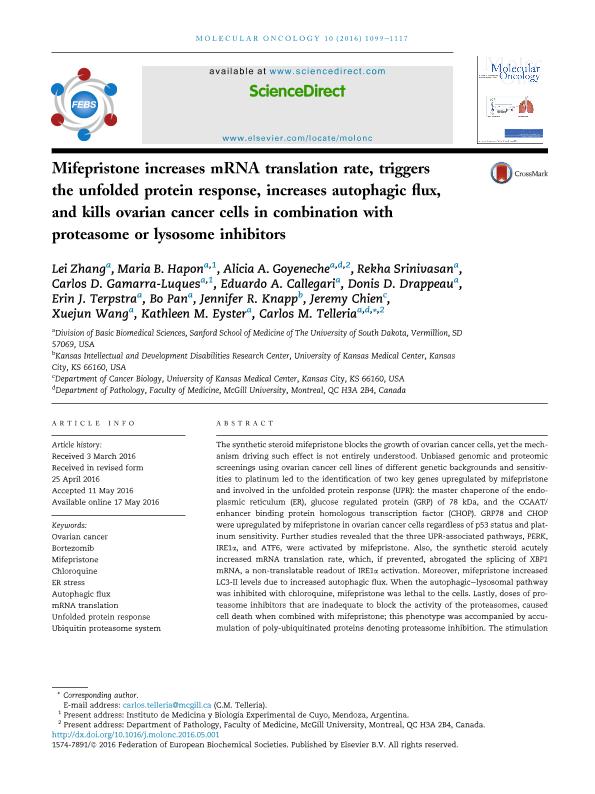Artículo
Mifepristone increases mRNA translation rate, triggers the unfolded protein response, increases autophagic flux, and kills ovarian cancer cells in combination with proteasome or lysosome inhibitors
Zhang, Lei; Hapon, María Belén ; Goyeneche, Alicia A.; Srinivasan, Rekha; Gamarra Luques, Carlos Diego
; Goyeneche, Alicia A.; Srinivasan, Rekha; Gamarra Luques, Carlos Diego ; Callegari, Eduardo A.; Drappeau, Donis D.; Terpstra, Erin J.; Pan, Bo; Knapp, Jennifer R.; Chien, Jeremy; Wang, Xuejun; Eyster, Kathleen M.; Telleria, Carlos Marcelo
; Callegari, Eduardo A.; Drappeau, Donis D.; Terpstra, Erin J.; Pan, Bo; Knapp, Jennifer R.; Chien, Jeremy; Wang, Xuejun; Eyster, Kathleen M.; Telleria, Carlos Marcelo
 ; Goyeneche, Alicia A.; Srinivasan, Rekha; Gamarra Luques, Carlos Diego
; Goyeneche, Alicia A.; Srinivasan, Rekha; Gamarra Luques, Carlos Diego ; Callegari, Eduardo A.; Drappeau, Donis D.; Terpstra, Erin J.; Pan, Bo; Knapp, Jennifer R.; Chien, Jeremy; Wang, Xuejun; Eyster, Kathleen M.; Telleria, Carlos Marcelo
; Callegari, Eduardo A.; Drappeau, Donis D.; Terpstra, Erin J.; Pan, Bo; Knapp, Jennifer R.; Chien, Jeremy; Wang, Xuejun; Eyster, Kathleen M.; Telleria, Carlos Marcelo
Fecha de publicación:
08/2016
Editorial:
Elsevier
Revista:
Molecular Oncology
ISSN:
1574-7891
Idioma:
Inglés
Tipo de recurso:
Artículo publicado
Clasificación temática:
Resumen
The synthetic steroid mifepristone blocks the growth of ovarian cancer cells, yet the mechanism driving such effect is not entirely understood. Unbiased genomic and proteomic screenings using ovarian cancer cell lines of different genetic backgrounds and sensitivities to platinum led to the identification of two key genes upregulated by mifepristone and involved in the unfolded protein response (UPR): the master chaperone of the endoplasmic reticulum (ER), glucose regulated protein (GRP) of 78 kDa, and the CCAAT/enhancer binding protein homologous transcription factor (CHOP). GRP78 and CHOP were upregulated by mifepristone in ovarian cancer cells regardless of p53 status and platinum sensitivity. Further studies revealed that the three UPR-associated pathways, PERK, IRE1α, and ATF6, were activated by mifepristone. Also, the synthetic steroid acutely increased mRNA translation rate, which, if prevented, abrogated the splicing of XBP1 mRNA, a non-translatable readout of IRE1α activation. Moreover, mifepristone increased LC3-II levels due to increased autophagic flux. When the autophagic–lysosomal pathway was inhibited with chloroquine, mifepristone was lethal to the cells. Lastly, doses of proteasome inhibitors that are inadequate to block the activity of the proteasomes, caused cell death when combined with mifepristone; this phenotype was accompanied by accumulation of poly-ubiquitinated proteins denoting proteasome inhibition. The stimulation by mifepristone of ER stress and autophagic flux offers a therapeutic opportunity for utilizing this compound to sensitize ovarian cancer cells to proteasome or lysosome inhibitors.
Archivos asociados
Licencia
Identificadores
Colecciones
Articulos(IMBECU)
Articulos de INST. DE MEDICINA Y BIO. EXP. DE CUYO
Articulos de INST. DE MEDICINA Y BIO. EXP. DE CUYO
Citación
Zhang, Lei; Hapon, María Belén; Goyeneche, Alicia A.; Srinivasan, Rekha; Gamarra Luques, Carlos Diego; et al.; Mifepristone increases mRNA translation rate, triggers the unfolded protein response, increases autophagic flux, and kills ovarian cancer cells in combination with proteasome or lysosome inhibitors; Elsevier; Molecular Oncology; 10; 7; 8-2016; 1099-1117
Compartir
Altmétricas



